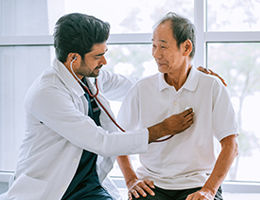We’re Stronger Together
With your help, we can make ambitious innovations in clinical care and education for our community.
The Geriatric Fellowship Program curriculum is designed to develop all core competencies through close mentorship, comprehensive didactic instruction, in-depth and broad-ranging clinical experiences, and an emphasis on scholarly work. As a graduate, you will be a well-prepared physician leader with advanced knowledge and expertise in geriatric medicine.
The acute inpatient geriatric rotation is an inpatient geriatric consultation service that utilizes comprehensive geriatric assessments and multidisciplinary processes to recognize and modify risk factors that may lead to poor outcomes among hospitalized patients. The inpatient consultation program can provide expert assistance in common geriatric problems such as delirium, prevention and treatment, dementia with behavioral changes and polypharmacy. The team may also address geriatric and care goals before procedures and treatments, cognitive or capacity assessments, and address falls or feeding difficulties.
Acute Inpatient Rehabilitation (AIR)
The acute inpatient rehab rotation is an inpatient geriatric consultation service that focuses on care coordination and management of complex medical care of the frail elderly from the acute hospital setting to acute inpatient rehab setting. The fellow will evaluate consult patients daily to expand their geriatric assessment skills by evaluating, managing, and transitioning older adults at particular risk for transition problems. Fellows will learn about how to address complex medical care issues as well as transitions of care problems which can result in re-hospitalizations, inappropriate emergency room use, and poor quality of care.
Outpatient Rehabilitation and Skilled Nursing Facility (SNF)
During this rotation, fellows will provide direct patient care in the post-acute rehabilitation setting of a nursing home and help coordinate adequate transition of care from both hospital to nursing home and nursing home to home/long term care facility. Fellows will participate in care plan meetings with an inter-professional care team. Fellows will learn administrative duties involved in nursing home management as well as rules and regulations as they apply to patient care in facilities with high patient to staff ratios.
During this rotation, fellows will learn about and practice caring for patients with comorbid psychiatric and general medical conditions within the general hospital and emergency setting and gain experience in consultation care focused on disposition, case formulation, management, and communication. They will work within a complex multidisciplinary team to address mental health related issues within the broader medical care system.
The Palliative Medicine team sees adult patients in all areas of the hospital including general wards, step-down units, and ICUs, and see patients from all disciplines across the spectrum of serious illness including acute life-threatening illnesses (trauma, sudden critical illness), cancer, heart failure before and after transplantation/LVAD, end stage lung disease, end stage liver disease, dementia, failure to thrive, stroke, and neurodegenerative disorders. The fellow will function as a physician-trainee member of a dedicated interdisciplinary team. This team includes attending palliative physicians, a palliative advanced practice nurse, a licensed clinical social worker, and a team chaplain.
Fellows will participate in several outpatient experiences in different settings and specialties applicable to geriatric medicine. These include adult specialty clinic, lifestyle medicine, neurology-movement disorder, rheumatology, geriatric psychology, and urology-gynecology.
Adult Specialty Clinic
Fellows will gain advanced clinical skills to diagnose and treat patients with dementing disorders such as Alzheimer’s disease, frontotemporal disorders, vascular dementia, dementia with Lewy bodies, and other related disorders. In addition, fellows will learn how to assess and manage patients with osteoporosis, recurrent falls, and polypharmacy.
Urology-Gynecology
Fellows will learn to evaluate and manage female urinary incontinence and pelvic floor disorders.
Rheumatology
Fellows will learn to assess and manage patients with osteopenia and osteoporosis. In addition, the fellows will become familiar with common multifactorial causes that may lead to falls.
Neurology
Fellows will learn to manage patients with cognitive impairment using a lifestyle medicine approach and participate in ambulatory clinics, including general neurology, Parkinson’s disease, and movement disorder.
Preventive Medicine
Fellows will gain advanced skills in supporting a state of health that allows maximal active life expectancy while maintaining high levels of function. In addition, the fellows will become familiar with promoting disease prevention and controlling chronic diseases of aging.
Fellows may select the following rotations if available:

With your help, we can make ambitious innovations in clinical care and education for our community.